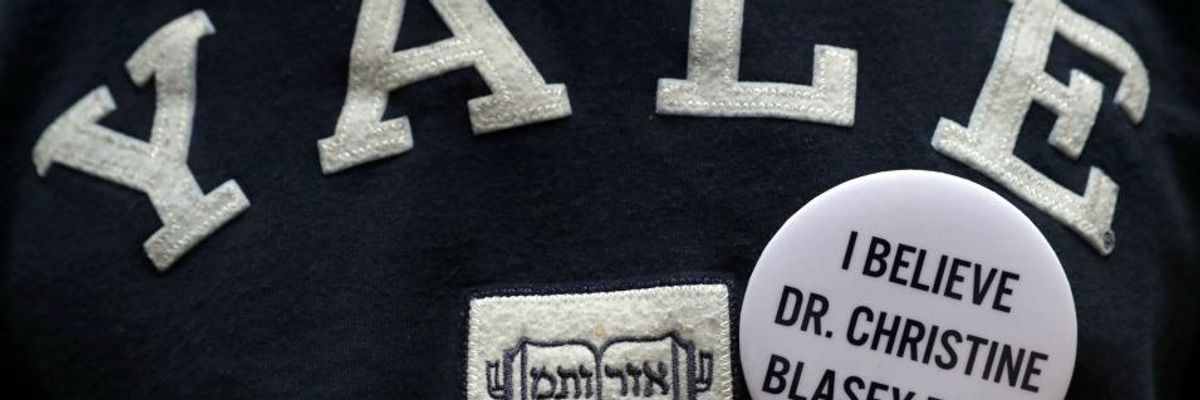Less than 24 hours after Common Dreams and other outlets reported on the existence of a circulating open letter by professors from law schools across the country expressing unequivocal opposition to Supreme Court Brett Kavanaugh--opposition based on his demonstrated "judicial temperament" and overt partisanship, not his judicial record or even the credible allegations of sexual assault levied against him--the number of signatories has more than doubled as support for its central argument grows.
On Wednesday, the letter had just over 500 signatories--including many from faculty at Yale Law School, the nominee's alma mater--but that number continued to rise and later in the day it was published by the New York Times and the signatures have continued to pile up.
"We regret that we feel compelled to write to you to provide our views that at the Senate hearings on Thursday, September 27, 2018, the Honorable Brett Kavanaugh displayed a lack of judicial temperament that would be disqualifying for any court, and certainly for elevation to the highest court of this land," the letter states.
Other law professors from accredited institutions wanting to sign, can request permission to do so here.
Here is the letter, in full, as published by the Times:
The following letter will be presented to the United States Senate on Oct. 4. It will be updated as more signatures are received.
Judicial temperament is one of the most important qualities of a judge. As the Congressional Research Service explains, a judge requires "a personality that is even-handed, unbiased, impartial, courteous yet firm, and dedicated to a process, not a result." The concern for judicial temperament dates back to our founding; in Federalist 78, titled "Judges as Guardians of the Constitution," Alexander Hamilton expressed the need for "the integrity and moderation of the judiciary."
We are law professors who teach, research and write about the judicial institutions of this country. Many of us appear in state and federal court, and our work means that we will continue to do so, including before the United States Supreme Court. We regret that we feel compelled to write to you, our Senators, to provide our views that at the Senate hearings on Sept. 27, Judge Brett Kavanaugh displayed a lack of judicial temperament that would be disqualifying for any court, and certainly for elevation to the highest court of this land.
The question at issue was of course painful for anyone. But Judge Kavanaugh exhibited a lack of commitment to judicious inquiry. Instead of being open to the necessary search for accuracy, Judge Kavanaugh was repeatedly aggressive with questioners. Even in his prepared remarks, Judge Kavanaugh described the hearing as partisan, referring to it as "a calculated and orchestrated political hit," rather than acknowledging the need for the Senate, faced with new information, to try to understand what had transpired. Instead of trying to sort out with reason and care the allegations that were raised, Judge Kavanaugh responded in an intemperate, inflammatory and partial manner, as he interrupted and, at times, was discourteous to senators.
As you know, under two statutes governing bias and recusal, judges must step aside if they are at risk of being perceived as or of being unfair. As Congress has previously put it, a judge or justice "shall disqualify himself in any proceeding in which his impartiality might reasonably be questioned." These statutes are part of a myriad of legal commitments to the impartiality of the judiciary, which is the cornerstone of the courts.
We have differing views about the other qualifications of Judge Kavanaugh. But we are united, as professors of law and scholars of judicial institutions, in believing that he did not display the impartiality and judicial temperament requisite to sit on the highest court of our land.
Signed, with institutional affiliation listed for identification purposes only, by the following....
[Signatures too many to list.]
With over 1,200 signatures as of this writing, the letter continues to add backers and comes amid a national wave of outrage over how Republicans in the Senate and the White House continue their efforts to ram through the nomination.
With a report from the FBI that critics have denounced as the result of a "sham" investigation in hand, Senate Majority Leader Mitch McConnell has scheduled a cloture vote for Friday, the beginning of the process that would force a full vote on the confirmation this weekend.
